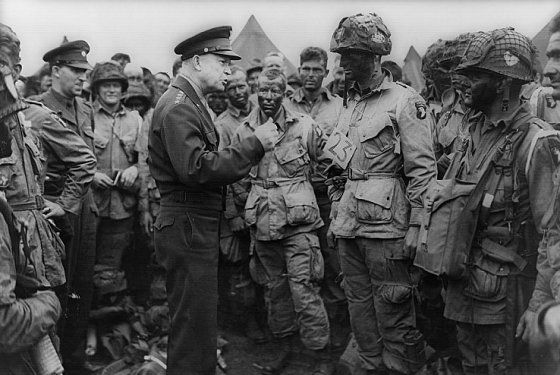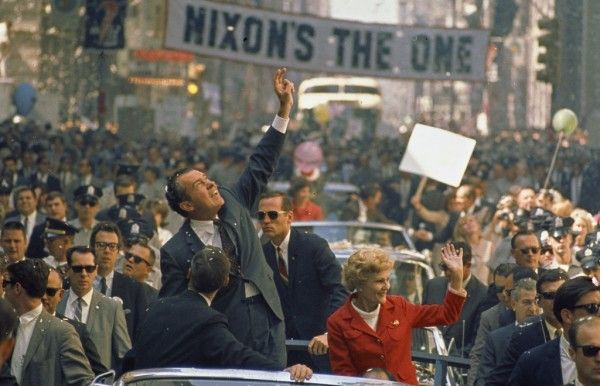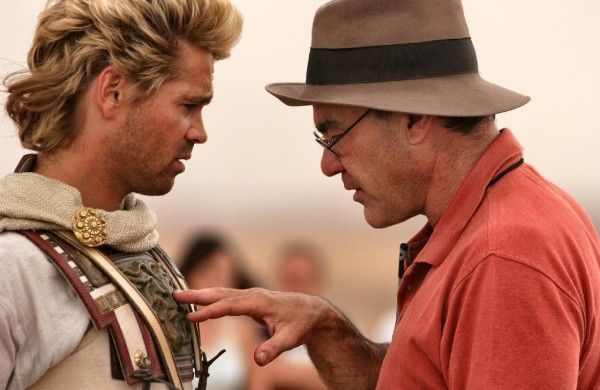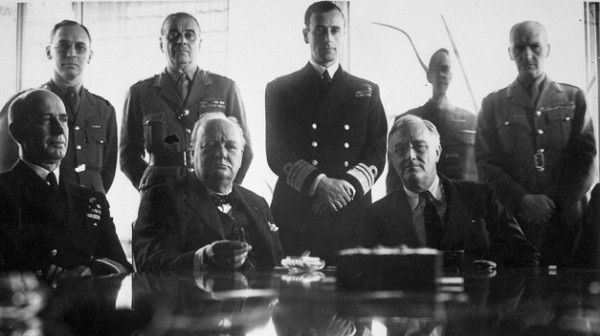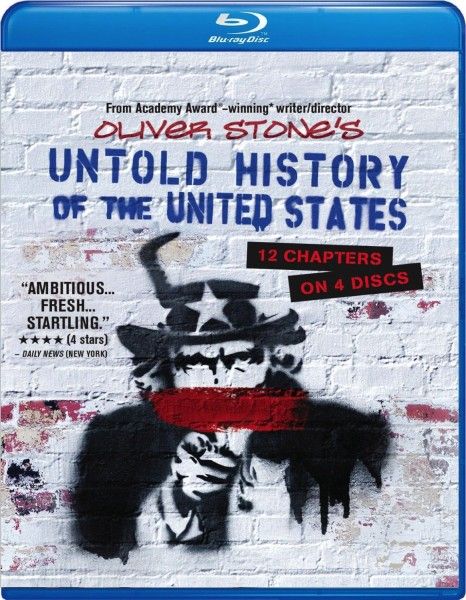Out on Blu-ray this week is Oliver Stone’s Untold History of the United States. The twelve part documentary series, co-created with American University professor Peter Kuznick, offers an alternative historical narrative by drawing focus to the scarcely remembered moments, forces, and figures that shaped the course of post-World War II America. In celebration of the release I recently participated in a small group interview with Stone. Over the course of sixty minutes he talked about the documentary series, the upcoming re-release of JFK, his past projects, and a whole lot more.
In this second segment Stone talks about the controversy associated with his name, differentiating between skepticism and conspiracy, his hopes for the JFK re-release, the upcoming fourth cut of Alexander, reflecting on Salvador and Savages, thoughts on digital media, and more. Find out what he had to say after the jump and check back this week for the final installment of the interview. Click here to read the first installment.
Question: Your films throughout your career have not just been subject to the usual filmmakers getting film criticism, but socio-political criticism has come your way.
OLIVER STONE: It hasn’t stopped.
When you do a project like this that is based on facts rather than your interpretation dramatically of something, do you react differently to that criticism?
STONE: I try to go on shows with Peter, but they will always have an Oliver Stone effect. It’s my name – I have created enough controversy that I’m always fighting an image. JFK was that divide. I was criticized for Born on the Fourth of July and Platoon and for The Doors before that; less so, for Wall Street, although it was. And when I made JFK, I never really came back. I reached a place where I was radical. I was not to be trusted. My critics said I was making up things. Well, we researched that movie. We put out a book a compendium to that movie that is still available. We may have made a few mistakes, nothing major. We got it right from eyewitnesses and all the information that we read. And the AARB, the Assassination Records Review Board, appointed in 1992, went on ‘till 1998, they had four million pages that substantiates and opens up further the holes we pointed out. That Warren Commission is Swiss cheese. It’s Alice in Wonderland. It doesn’t make any sense from the magic bullet theory to Oswald, the members knew that. Even Lyndon Johnson doubted the findings, they knew it was a whitewash any more than the 9/11 Commission was finally trusted. We don’t have a good record in our country, except for the Gerald Nye Committee, which is in our book. Gerald Nye, in the 1930’s, did a great job investigating war profiteering in World War I. He found quite a lot of shit, Woodrow Wilson and Morgan Bank. But, that was on the eve of World War II, so his timing wasn’t very good. If we went to war, he wanted the profiteers to pay 98-percent on their corporate profits at that point. It’s a good proposal [laughs].
In the introduction to this series, you say that you want to look at history and place its people in the proper context. How difficult is it for you not to succumb to a degree of cynicism when you’re looking back at what happened?
STONE: We’re back to Jim Crow. They’re all in jail. Ballot security is more important than anything in this country. When you have a Voter ID in twenty-something states. The Supreme Court gutted the Voting Rights Act, there’s a lot of shit going on and this Tea Party thing is white supremacy in a way.
How do you maintain a degree of optimism?
STONE: I think we should talk about it. Write about it. By exercising our ability to think and choose, we can go out there and protest. This is very bad time. This country has always been in crisis since I remember. Just stay alert. I suppose I’m sticking around to see what happens. The tension of this, I use Ronald Reagan’s words, ‘evil empire’ persists gives me interest as a dramatists. Militarily, we’re really strong. The question is whether we can keep this economically and morally. Martin King had something when he said we have soul force. Can we do this with an honest face? Can we keep lying to ourselves?
We’re at a critical juncture right now. It must be incredibly fun for you to document.
STONE: Fun in a dramatist way. I think that’s why he is asking why not become cynical and I understand the question is precisely because there is an outcome that is still in jeopardy. We don’t know.
As your documentary illustrates we’ve seen generations of the public give government lies and manipulation a pass. Are we at a point where people are finally going to stand up and do something about it?
STONE: That a huge question and again, a reason to stick around. It’s a good question. Obviously the American people are for the most part uneducated because television keeps them that way, it seems to me. They’re ignorant. They believe Obama Care is still death panels or whatever it is. They don’t have the correct information. So it’s very easy to keep people in the dark. Fox News does a great job of that, so does the Murdoch empire, so do the Koch Brothers. They do a great job of financing organizations to believe that the government is evil, is undoing their right to bear arms. That’s another thing. Yeah, it is a critical time. It’s always been a critical time, because they’ve been fighting for power since the beginning of mankind. I don’t know that it’s any more critical. Let’s say the government shuts down, maybe it’s not such a bad thing either, because the empire- they’ll always pay the military someway. They’ll take it out of our last monies, we’ll be starving in the streets, but we’ll still have that empire. We have those bases abroad to feed. This is a gigantic monster. Every day we wake up our Godzilla machine has to eat; trees, eggs, mountainsides. We have to eat in order to survive. We have to grow. The empire will either grow or fall. We’ll see.
Is part of the teacher in you hoping that this release maybe enlightens the public again?
STONE: JFK? I don’t know. JFK has a great speech at the end. ‘It’s up to you’, it ends. Costner’s last summation in the courtroom is based on his final- it’s almost, not verbatim, but it’s based on his final words. Do I think it would have a result? Listen, it was there then, it is there now. I hope people can see it again. I hope you remind them of some of the power of the film. I would urge them to think for themselves. How we can get a true candidate for reform is an issue in this country. How do we get away from a two party system to a third party, which would truly be a reform party, is a big question. There’s ways the world changes without domestic issues; the ways that they change externally. Maybe the Chinese in some way can affect the United States economy and help us to see ourselves in a better light. Maybe more Chinese, Asian immigrants, more Hispanic immigrants, it’s very helpful to pushing the United States away from a rigid, white mentality, which seems to be what we’ve seen in congress.
Where do you draw the line between a healthy degree of skepticism and just conspiracy mongering? Because there are people that still believe that Obama was not born in America.
STONE: Yeah, and some people believe I’m nuts to say that Kennedy was killed by the US government, by CIA elements. Where do you draw the line? You present your case. I think that Obama presented his case effectively that he was born in Hawaii [laughs], and I think we presented our case effectively. Whether it was reported so, I can’t say. But the media has a huge role to play and, as you know, we saw in the Snowden case, the Wikileaks case, and we see in the constant battle between the whistleblower and the government, that we’re still fighting for the right to report correctly. That’s a huge battle.
A lot of your films have found new life on home media and now it’s so much about digital media. I was just wondering, as a filmmaker, say you saw someone watching JFK or Untold History on an iPad or an iPod, how would you feel about that?
STONE: I’ll take it any way I can get it [laughs]. I’ll tell you, it’s a shame because I love movies on a screen, but I understand people have different mentalities now. But I think on small screens they’d like to see action right away or sex. It just doesn’t seem like it would be necessarily thoughtful stuff. Because to hold a phone and look at it for an extended period of time to entertain an argument doesn’t seem quite the way it works. Whereas in the dark it seems that you have the power of persuasion, the power of seduction with you. It’s sexier.
Did what you learned while you were researching and making Untold History alter your opinion at all of any of your own historical films like JFK or Nixon?
STONE: No, actually. I mean, no, I can’t say so. I know what I did in Salvador- I combined a lot of stuff. I had to. I jammed it, because that was my first big film. Yeah, I would probably- but that was a film that was what it was. It was an insane gonzo film. I’d say that was the least accurately historically, but I think Nixon, JFK, and W. do hold up. So does Salvador, as a film. And by the way I agree with the Leftists in that battle. They fought a horrible war, the United States got involved, same as in the film, and helped support a repressive regime. No, I can’t back off on that. Not that I was looking at that. I would have entertained any- I would tell you if I felt differently. Except Alexander, I re-did a fourth cut. You’ll see it next year. Not for historical reasons, for dramatic reasons. I was too close to history in some ways. You’ll see it next year from Warner Brothers. They did very well with the third cut in 2007 and this fourth cut is the best yet.
Wasn’t the third cut called “the final cut”?
STONE: It was called the final cut. [Laughs] This is the ultimate cut. I came up with a better one. What’s beyond ultimate? Nothing. This is it. This is it. I don’t have any more for you. Come on, I went back for nothing and did it again.
Is it possible for you to make a film like JFK today? Or do you see a film like Savages having a commentary now that maybe JFK had when it came out?
STONE: No. No, Savages was a- but it was a hidden part of our society; the border war. And I also think to a large degree in its own storytelling way, it’s about the war on drugs, which I think is ridiculous. And you see at the end of the movie that the DEA agent is the biggest winner of all, as always. They get bigger and bigger and more corrupt. No, I can’t say that the DEA is corrupt. I can say that Travolta was corrupt, but the war on drugs is corrupt.
Is it possible for you to make a JFK today?
STONE: I think this is my attempt to do that. This is a bigger movie than JFK. This is not about one president being killed. This is about the system being subordinated to higher needs of military, industrial, corporations, and the United States after World War II. This is really what it’s about. This is a huge subject. It cannot be done as a feature film. How can you do it? Have three generations of people live through this? It would be a TV series- possibly as a TV series, but it would have to be very ingeniously written.
Did you find stories in the course of this that you would like to dramatize?
STONE: Oh there’s great stories.
We were talking about the political officer on the soviet submarine.
STONE: Oh, yeah, Arkhipov.
That sounded like there’s a movie there.
STONE: That’s a movie, yeah. I love those movies. That’s an important movie. It’s a great movie, yeah. Yeah, I think you can make- Henry Wallace is a great Gary Cooper character. John Kennedy is a great character. Yes. I did a movie on Bush, come on, give me credit. I did movies on Nixon and Bush. These are two of the most, for me, despicable- detestable men, not despicable, detestable men. They really hurt our country. And I made movies about them from that point of view. So I’ve made a huge effort to go to the other side to understand.
In the closing of Untold History you talk about a woman that you met in the 1970’s and her telling you to feminize the planet, and you closed it with love. How did that come about?
STONE: I don’t want to trivialize it, but yes. I know a young woman now who’s worked on MoveOn, not this woman, but her new documentary is about testosterone. She says that testosterone is ruining this planet, [laughs] and I’m curious to see it. But there is an argument to be made that testosterone has to be modulated. It’s just when men get this- and women too, I include Hilary Clinton. I have to. I have to include Madeline Albright. And I include- I mean women have proven hawks; Golda Meir, Gandhi in India- I mean the woman leader, they’ve been very, very hawkish. So let’s not separate that. But the concept of going head to head and fighting something out has got to be re-examined. It doesn’t work through time. Negotiation, peace keeping is the highest value of all. Those heroes like Henry Wallace, Martin King, John Kennedy, Franklin Roosevelt, those are the peacekeepers. We need them. Carter tried and Clinton briefly tried. Obama, I think, tried. But I think we need these people in our system and our system defeats them time and time again because money is made by creating conflict and strife.
The movie and the book both kind of end on a question mark as far as Obama is concerned. Do you think there’s hope that he will?
STONE: I hope so. I always say- it says in the series that “history has taught us that the curve of the ball…is something that we never know.” I forgot exactly the quote, but it’s a beautiful quote. It’s in the series, not the book, and I really believe that. We didn’t know about the fall of the Soviet Union. We didn’t see it coming. I was shocked. We all were. It was a beautiful moment and we had a moment of peace, of potential peace. We didn’t see 2001. We had hopes for Obama, for reform. Henry Wallace we had tremendous hopes for. There are all these moments in history. If Kennedy hadn’t been assassinated in Dealey Plaza he would have won that election. That was a huge deal, a huge deal because that second term would have freed him up in a way. All these things can change, so we don’t know. And when you think an empire is going to control everything and is going to go a certain way that’s exactly the moment when it doesn’t go that way. Maybe this government shut down, it might be the curve of that ball that no one foresaw. You know? Stay open. Things don’t always turn out the way you think they’re going to turn out. That gives me hope, by the way. That’s why I’m not cynical and despairing, as you asked me. It’s very hard not to be sometimes.
I’m curious if you’ve been approached or talked with any people in politics over the years and how they’ve received what you’ve put out the world.
STONE: I’ve met a lot of politicians, yeah, presidents. I think the politicians look at themselves as professionals. I mean I’ve met some good ones too, Barbara Lee from Oakland, very open, but even them- they’re always thinking about being reelected. They’ve always got an agenda. They’ve got a schedule. They’ve got to raise money. It’s an impossible job it seems. They spend 40% of their time raising money, so intellectual debate is not something that they’re very- they respond more to practical issues. How to get something through congress, how to get a bill done, how to make something work, and that’s very practical, but it’s not reflective.
They seem more preoccupied with how to get something not to work these days, don’t you think?
STONE: No, I think many of them have a good heart, but it’s very hard to get something through in this very polarized time. It’s always polarized.
You said during the making of JFK how you thought that movie was going to be the end of you, do you always get that kind of feeling making a movie?
STONE: Is that what I said?
Yeah, when you were discussing Alexander a few years ago you said that you had that feeling during Alexander that you had during JFK.
STONE: Oh, I see. Well I was gambling big stakes and I just knew that I was going to get- I just up against a big…it was a big appetite there. Alexander was the story of a man who set out to- who did explore to the end of the world, conquered too, and never lost a military battle; tremendous man, interesting, also an educator. He never went back. He never looted the places and went back to Macedon or Greece like most of the conquerors did. He actually tried to integrate that which he conquered with what he knew. He intermarried his armies, his generals, the culture. Of course he pissed off a lot of people doing so. In other worlds he was integrating the world, which is a wonderful idea, and I think leads to peace. And he was a peacekeeper in the end. In fact, his battles were very economical in terms of what he lost. He preserved life. He really was a peacekeeper in my opinion. That’s why I made the movie. And the fourth version you have to see, please. Its only 3 hours and 26 minutes, but you must see it. It’s one of my best films.
Are you going to come back and do another talk like this?
STONE: I will come back next year for Warner Brothers, of course I will. Jeff Baker loves this. Listen, we sold a million copies of that 2007 version. Don’t forget that was what drove this demand to make this. On the website it’s got a huge following. People love that movie. Some hate it, but they're looking at the 2004 movie, which is structurally flawed. I think this is the one.
Look for Part 3 soon.

